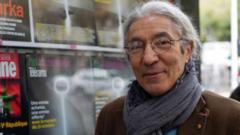Boualem Sansal's disappearance in Algeria, amid fears of a crackdown on dissent, highlights the tense relationship between France, Algeria, and the challenges faced by its writers.
France Raises Concerns Over Franco-Algerian Novelist Boualem Sansal's Disappearance

France Raises Concerns Over Franco-Algerian Novelist Boualem Sansal's Disappearance
French President Emmanuel Macron voices alarm over the missing writer's fate, emphasizing the need for freedom of expression.
Boualem Sansal, a Franco-Algerian novelist known for his critical stance against the Algerian government, has not been seen since his arrival in Algiers last Saturday, prompting significant concern within France. President Emmanuel Macron has joined the chorus of voices seeking information on Sansal's whereabouts. Reports from French media suggest that he may have been detained by Algerian authorities upon arrival. A spokesperson for the Elysée Palace expressed Macron's deep concern for Sansal's freedom, highlighting the writer’s intellectual contributions.
French political figures, particularly those from the center and right, have publicly expressed their fears for Sansal, who is a prominent critic of both the Algerian government and the growing influence of Islamism in the country. Former Prime Minister Édouard Philippe emphasized that Sansal represents the core values cherished in France—reason, freedom, and humanism—against a backdrop of censorship and corruption. Marine Le Pen, the far-right leader, praised him as a courageous advocate for liberty.
Friends of Sansal were the first to raise alarm when they reported that his mobile phone was silent and he never arrived home in Boumerdès. The lack of an official response from Algerian authorities stands in stark contrast to the urgency expressed in France. Kamel Daoud, another well-known Franco-Algerian writer and supporter of Sansal, echoed concerns, indicating that he believed Sansal had likely been arrested. Daoud criticized the Algerian regime, stating, "Being a writer in Algeria is an onerous task," reflecting on the increasing danger posed to intellectuals in the region.
The unpredictable relationship between France and Algeria could have implications for this case. Some speculate that Sansal's disappearance may be linked to a potential backlash from the Algerian government due to France's recent initiatives to strengthen relations with Morocco. This shift, particularly after Macron's state visit to Morocco, has caused significant discontent among Algerians, many of whom view French support for Moroccan claims in Western Sahara as a betrayal.
Reports suggest that Sansal may have drawn the ire of the Algerian regime for his controversial comments regarding Algeria's historical sovereignty and the role of the Polisario in regional politics. Over the years, both Sansal and Daoud have faced criticism from Algerian officials, who accuse them of adhering to foreign narratives at the expense of national dignity.
Despite his foundational work in the Algerian Interior Ministry, Sansal has faced significant opposition due to his views, particularly after representing Algeria at a literary fair in Jerusalem in 2012. Meanwhile, Daoud, who rose to fame with his novel "The Meursault Investigation," is currently battling legal challenges in Algeria, which some interpret as retaliation against writers who challenge prevailing narratives.
The ongoing plight of Boualem Sansal reinforces the precarious position of writers in Algeria, casting a shadow on the state of intellectual freedom in the region.






















